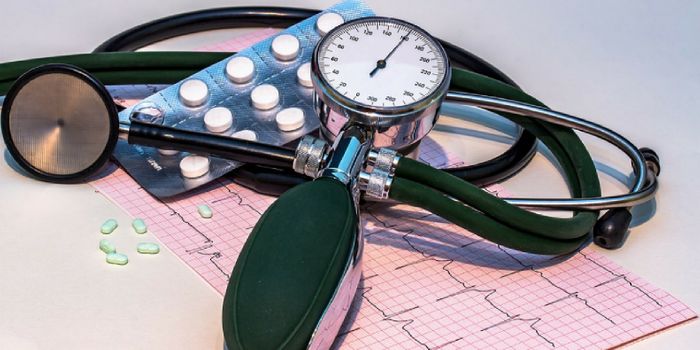The resistance to blood flow is increased in narrow arterial blood vessels. You'll experience increased blood pressure because of the increased resistance caused by narrowed arteries. Over time, the extra strain on your heart might lead to serious complications. The prevalence of hypertension is high. After the standards were updated in 2017, over half of all U.S. adults may now meet the criteria for this diagnosis.

Most cases of hypertension manifest gradually over the years. Noticing any signs is unusual. High blood pressure can harm your blood vessels & organs, including your brain, heart, eyes, & kidneys, even if you don't feel sick.
Timely diagnosis is crucial. Checking your blood pressure regularly will allow you and your doctor to see any abnormalities early. A doctor may ask you to monitor your blood pressure for a set amount of time (say, a few weeks) if they suspect your readings are too high.
Medication and behavioural modification are important components of hypertension treatment. Heart attacks and strokes are among the complications that might arise if the illness is not managed.
Symptoms
Most persons with high blood pressure experience no symptoms, even at extremely high readings. There may be no outward signs of high blood pressure for just a long time. A small percentage of persons with hypertension may also have:
- Headaches
- Weakness in the ability to take a deep breath.
- Nosebleeds
Yet, there is no specificity to these signs. They often manifest only in the latter life-threatening stages of hypertension.
When You Should See a Doctor
Monitoring patients for high blood pressure is an integral element of preventative medicine. The frequency with which one should get their blood pressure monitored varies with age and general health. Beginning at age 18, you should request a blood pressure reading from your doctor every two years. If you're 40 or older, or 18 to 39 and at high risk for high blood pressure, you should get your blood pressure checked once a year.

If you have high blood pressure or other risk factors for heart disease, your doctor may advise you to get your readings done more frequently. When a child is 3 years old and above, their doctor can take their blood pressure as part of a routine exam.
You may get your blood pressure checked for free at a health resource fair or other community events if you don't have a regular doctor. Several shops and pharmacies even provide these blood pressure devices at no cost to customers. The accuracy of these machines is contingent on several factors, including the right cuff size and the right way to utilize the equipment. Consult your doctor before using a public blood pressure machine.
Options For Treating Hypertension
Your doctor will choose the optimal course of therapy after considering a variety of criteria. Two examples of such variables are the kind of hypertension you have and if its causes have been determined.
Options for the Initial Management of Hypertension
The high blood pressure that comes with a diagnosis of primary hypertension may be manageable with a few lifestyle modifications. Your doctor may prescribe medication if the recommended lifestyle modifications are insufficient or ineffective.
Treatment Options for Secondary Hypertension
If your doctor determines that your hypertension is due to something other than hypertension, therapy will concentrate on resolving that underlying problem. If, for instance, your doctor notices that the blood pressure medicine you've begun taking is raising your blood pressure, they may switch you to one that doesn't cause this problem.
When the underlying cause of hypertension is treated, the condition might sometimes continue. Depending on the severity of your hypertension, your doctor may recommend a combination of lifestyle adjustments and medicine to get your blood pressure down.
Hypertension treatment paths tend to morph over time. What was helpful in the past might be less helpful now. Your doctor will keep working with you to find the optimal course of therapy.
Medications
Using many drugs to treat high blood pressure is a process that many individuals go through. Your doctor may need to test a few to identify the right drug or combination of medications.
The following are examples of hypertension medications:
Beta-blockers, for instance, reduce the intensity and rate of heartbeats. As a result, your blood pressure will decrease since less blood will be pushed through your arteries with each heartbeat. It prevents the release of hormones that contribute to high blood pressure.
Blood pressure can rise due to high salt intake and overall fluid retention. Therefore diuretics may be helpful. Diuretics, sometimes known as "water pills," assist the kidneys in flushing out excess salt. Your blood pressure drops because of the loss of salt and the accompanying increase in the volume of urine you produce.
Although angiotensin-converting enzyme (ACE) inhibitors work to prevent the production of angiotensin, angiotensin II receptor blockers (ARBs) prevent angiotensin from connecting with receptors. If the chemical is missing, the blood vessels will not constrict. In turn, this aids in blood pressure reduction by relaxing blood arteries.
Calcium channel blockers reduce the amount of calcium reaching the heart muscle. The result is reduced heart rate and blood pressure. These drugs also act on the blood arteries, relaxing them to reduce blood pressure.
Medication of the alpha-2 agonist class modifies nerve impulses responsible for vasoconstriction. This aids in the relaxation of blood vessels, lowering blood pressure.




